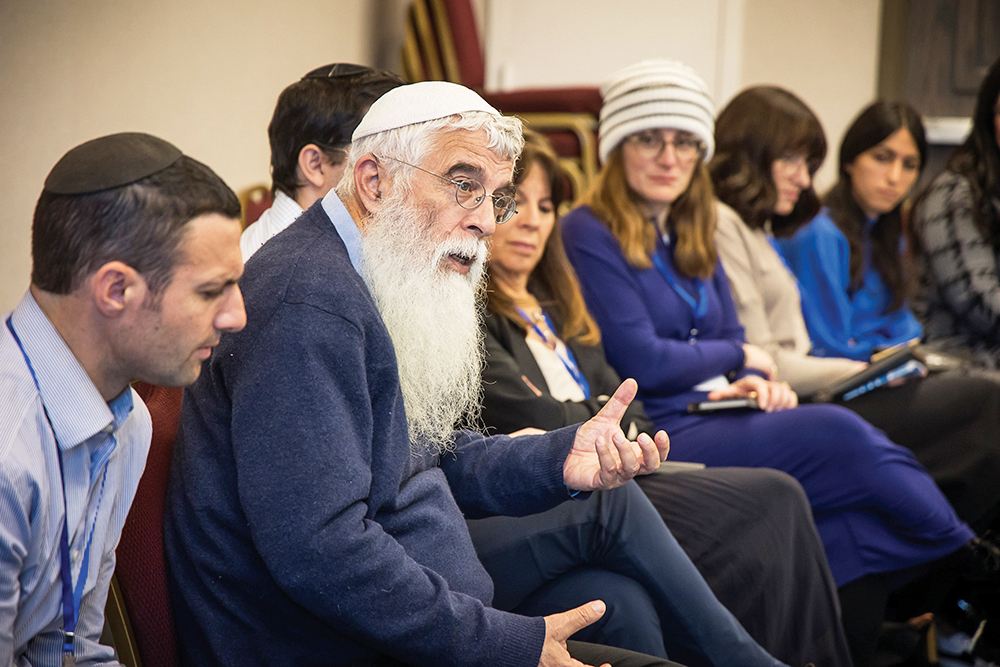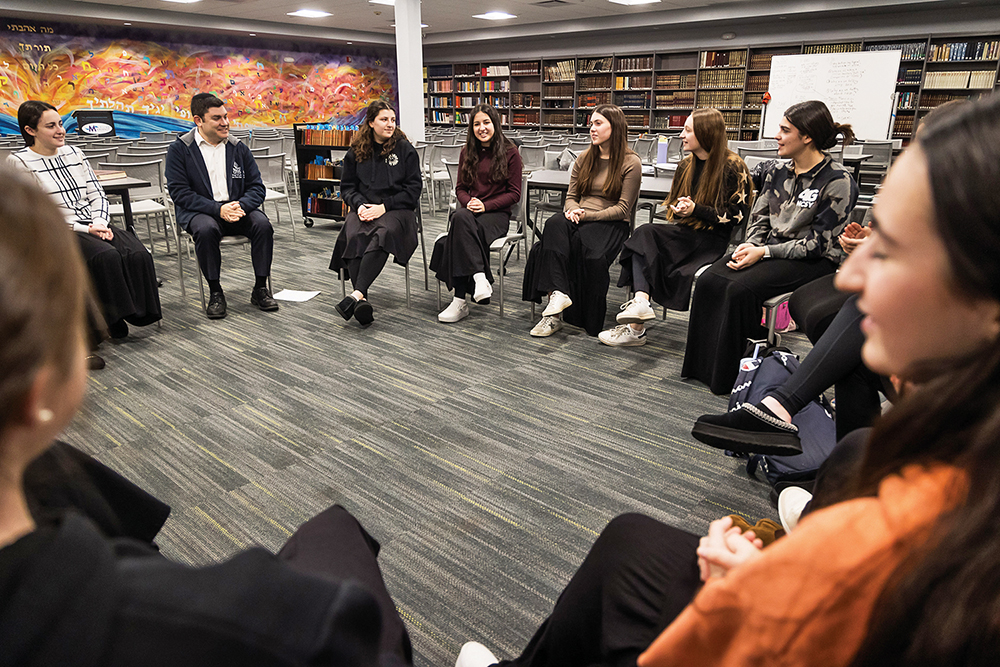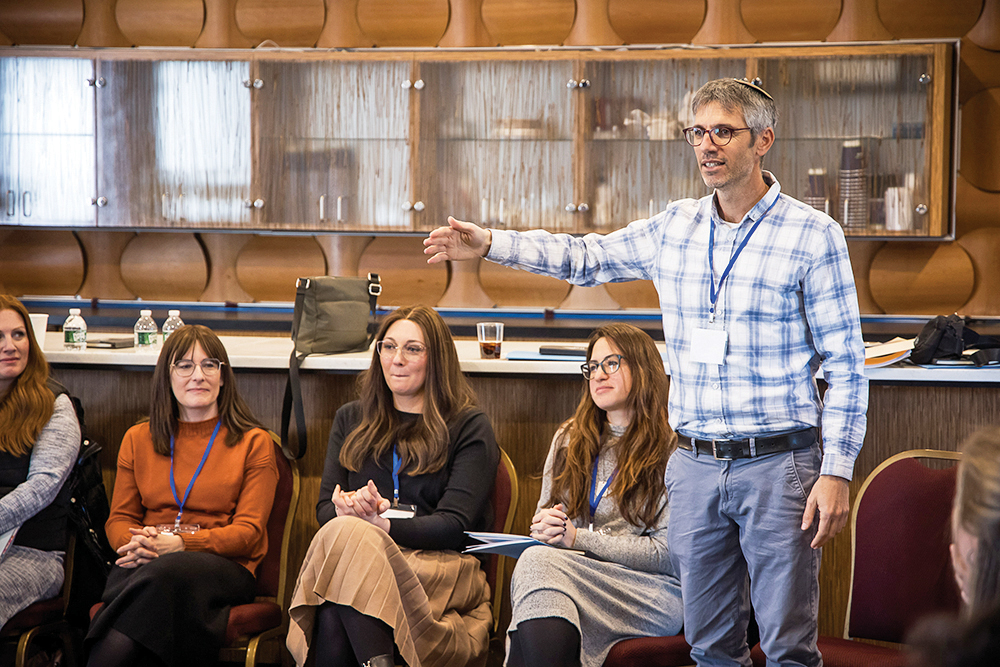
A series of programs centered around Lifnai Vlifnim’s annual Winter Seminar will host Rav Dov and Yishai Singer around the theme “Deepening Connections in a Post-October 7 World.” Following the December 13-14 Shabbat Parshat Vayishlach in Riverdale, and Motzei Shabbat, December 14 in Woodmere, the seminar will be host to more than 100 educators from around the world for a two-day workshop exploring how the Lifnai Vlifnim programs are transforming Torah education.
Eleven of the participating schools are in the New York/New Jersey area and include Ateres Beis Yaakov, Barkai Yeshiva High School, Joseph Kushner Hebrew Academy/Rae Kushner Yeshiva High School, Ma’ayanot, Manhattan Day School, Naaleh High School for Girls, North Shore Hebrew Academy, Ramaz Middle and Upper School, SAR Middle and High School, Westchester Torah Academy, and Yeshiva of Flatbush. The community is invited to join seminar participants on Sunday evening, December 15 for a special conversation with Rav Dov and Iris Singer.

Lifnai Vlifnim is a program developed in 2005 by Rabbi Dov Singer, and is one of several training programs for educators, administrators and others committed to focusing on the student as well as subject material. Rabbi Singer started this program along with the Beit Midrash L’Hitchadshut, the Renewal Outreach Center, a nationwide outreach study and prayer program for personal and spiritual development. The center is housed in the same facility as Yeshivat Makor Chaim, a high school that serves close to 300 students, of which Rabbi Singer is rosh yeshiva. The school was founded in 1985 by visionary Torah scholar Rabbi Adin Steinsaltz-Even Yisrael, and is currently housed in a new, state-of-the-art facility in Neve Daniel.
Lifnai Vlifnim is a term used in rabbinic literature referring to the inner sanctum of the Beit Hamikdash where the Kohen Gadol enters the Kodesh Hakodashim on Yom Kippur to sprinkle the blood upon the mizbeach. Lifnai Vlifnim is also used metaphorically to describe heartfelt prayer that can penetrate the “inner chambers” of divine connection.

Twenty years ago, Rabbi Singer set out to address a common challenge in Jewish education worldwide. While our educators excel at developing their students’ ability to “do Judaism” through practicing the mitzvot, learning Torah or reciting the words of tefillah, they struggle with their internal, personal connection to God and to their own Jewish souls. In founding Lifnai Vlifnim, Rabbi Singer developed an innovative approach that considers the entire faculty/student encounter in the Torah learning process. To enhance the students’ emotional dimension in learning Torah, Lifnai Vlifnim focuses on enriching the educators’ own spiritual experiences.
Two core concurrent structures reflect the parallel teacher and student experiences. The first structure is the Faculty Chaburah, which meets regularly for a protocoled discussion in which teachers learn together while harnessing their own reflections, connections and growth.
The second structure is Lev HaShavua, a weekly period during which teachers facilitate a protocol in the classroom similar to the one used in their own chaburah.
Rabbi Yehuda Chanales serves as the director of Lifnai Vlifnim Olami, worldwide. As a member of the Judaic faculty at Ma’ayanot High School for Girls in Teaneck as well, he has witnessed firsthand the impact of the program within the school.

“Over the past three years, I have had the privilege of working with Ma’ayanot in two mutually enhancing capacities. As director of Lifnai Vlifnim, I supported the school externally by coaching, designing seminars and providing resources along with others in our school cohort program. As a faculty member, I led a Lev HaShavua group with the students and watched the stages of implementation and response. Drawing upon both of these perspectives, we have been able to glean critical lessons from Ma’ayanot’s success that can help us to generate whole school change, lessons that we hope others can benefit from as well.”
Ma’ayanot’s leadership team under the direction of Head of School C.B. Neugroschl, integrated Lifnai Vlifnim into their educational mission enthusiastically. She said: “The result of the work of our educators and their widespread embrace of Lev HaShavua has changed our school culture significantly. It is our weekly Lev HaShavua classes that capture our students’ hearts and souls and create a buzz of positivity.
Our school community has been transformed by the connections forged and the lessons learned in two short years during which we have been implementing the program,” Neugroschl continued. “Using protocoled weekly discussions and limudim which we aptly call our avodah penimi, or A.P. for short, we have been able to integrate our Torah goals with our social-emotional goals. We have developed a map to guide our shared journey towards increasing our comfort and capacity to discuss the contours of our avodat Hashem with each other and with our students.”
Rabbi Adam Friedman serves as the mashgiach ruchani and middle school rebbe at Manhattan Day School. Friedman initially met Rav Singer over 10 years ago when he was treated to a transformative educational experience. Since joining MDS, Friedman has been seeking ways to join the Judaic faculty together. When it was suggested that he attend the local Lifnai Vlifnim Winter Seminar, he jumped at the opportunity to reconnect to Rav Singer and his son Rav Yishai Singer, who works alongside him and Rabbi Chanales.
Rabbi Friedman brought the program back to MDS. “Our first cohort is our Judaic studies faculty composed of three women and four men, as well as our Judaic studies principal and head of school,” he said. “Our goal is to create a cohesive and supportive team that would in turn bring the framework of Lifnai Vlifnim to the students. After a few sessions, we reached the ‘vulnerable’ stage, vacillating between sharing and remaining quiet. At this point we feel that the biweekly faculty meetings have created a sanctuary for us, a place of togetherness, where our personal stories can be shared, supported and encouraged. We are so appreciative of the Lifnai Vlifnim team for bringing this wonderland magical program to our school.”
Currently, Lifnai Vlifnim includes 21 cohort and alumni schools, more than 250 teachers engaged in regular sessions in their schools, and more than 2,500 students participating in weekly Lev HaShavua sessions. The feedback from faculty and students has been overwhelmingly positive. As expressed by an SAR student, “Our Lifnai Vlifnim class inspired me to not only strive to daven more frequently, but to daven with real kavanah and truly appreciate Hashem’s hand in our world. I can say that I am truly a different Jew than I was at the beginning of the year and I am so grateful for the help I am receiving which is guiding me on this journey.”
For more information about the upcoming Lifnai Vlifnim events in our area, including the Winter Seminar for Educators in Fort Lee, please visit lifnaivlifnim.org, makorchaim.org or email makorchaimusa@gmail.com









